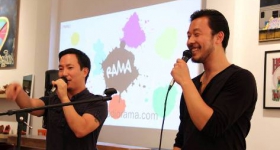(Photo via.)
Well, March is a busy, busy month and I've gotten off track with my Women's History Profiles. But now I'm back, and back to a new America: one with a reformed healthcare landscape. So in honor of "Obamacare," my last three profiles of outstanding Asian American Women will address health issues.
Mai Neng Moua is in many ways typical of the type of Asian American overachiever we like to notice (and to be) here at Hyphen: literary, community-oriented, a magazine founder, an anthology editor; a Gen X, 1.5 generation immigrant from a war-torn country, busy empowering her own generation, and reaching back to bridge the gap with her elders.
But end-stage kidney disease almost put an end to that trajectory before she finished college.
Moua was born in Laos in 1974. In 1976 her father was killed in the conflict that had spread through Southeast Asia, and her family fled to a refugee camp in Thailand. In 1981 they emigrated to the U.S., first to Pittsburgh, but eventually, in 1987, to St. Paul, Minnesota, where there is a substantial Hmong community. Moua attended the nearby private college St. Olaf, where she developed an interest in writing and literature.
Her junior year of college, she was, rather suddenly, diagnosed with end-stage renal failure, and confronted with a more dramatic, and serious, culture clash than even most immigrants of her description are faced with.
Moua remembers in her writing the fights with her family over her healthcare, whether she should have her kidney biopsied and undergo dialysis, or whether she should trust to Hmong herbal medicine instead. She writes of her depression when her friends seriously offered her their kidneys -- rather than subject her to a risky, two-year or more wait for a cadaver kidney -- while her own family refused to donate; and of her scandalous efforts to move away from home and maintain a job in the midst of her illness, so as not to overburden her family.
It was in her struggle to find a way to write about these confusing experiences, of how alone she felt, and how powerless when making decisions her entire family disapproved, that she discovered the dearth of Hmong American literature in publication. While still sick in 1994, Moua founded the Hmong literary journal Paj Ntaub Voice to give voice to herself and others of her community struggling with the same difficulties of understanding and narrative.
In the end, she accepted a kidney donation from a friend, and has continued to edit and publish the Paj Ntaub Voice through the Hmong American Institute for Learning, dedicated to the preservation of Hmong American culture, where she is executive director. In 2002 Moua collected work from the first 8 years of the journal into an anthology of Hmong literature called Bamboo Among the Oaks. She continues to try to bridge the gap between generations in her community, and to convince elders to tell their stories.
I stood my ground
It's not enough that I am here
I want the imprints of their names
Some American proof that they were known
Their courage recognized
-- from "D.C." in Bamboo Among the Oaks
(Thanks to Bryan Thao Worra for the tip!)









Comments